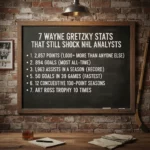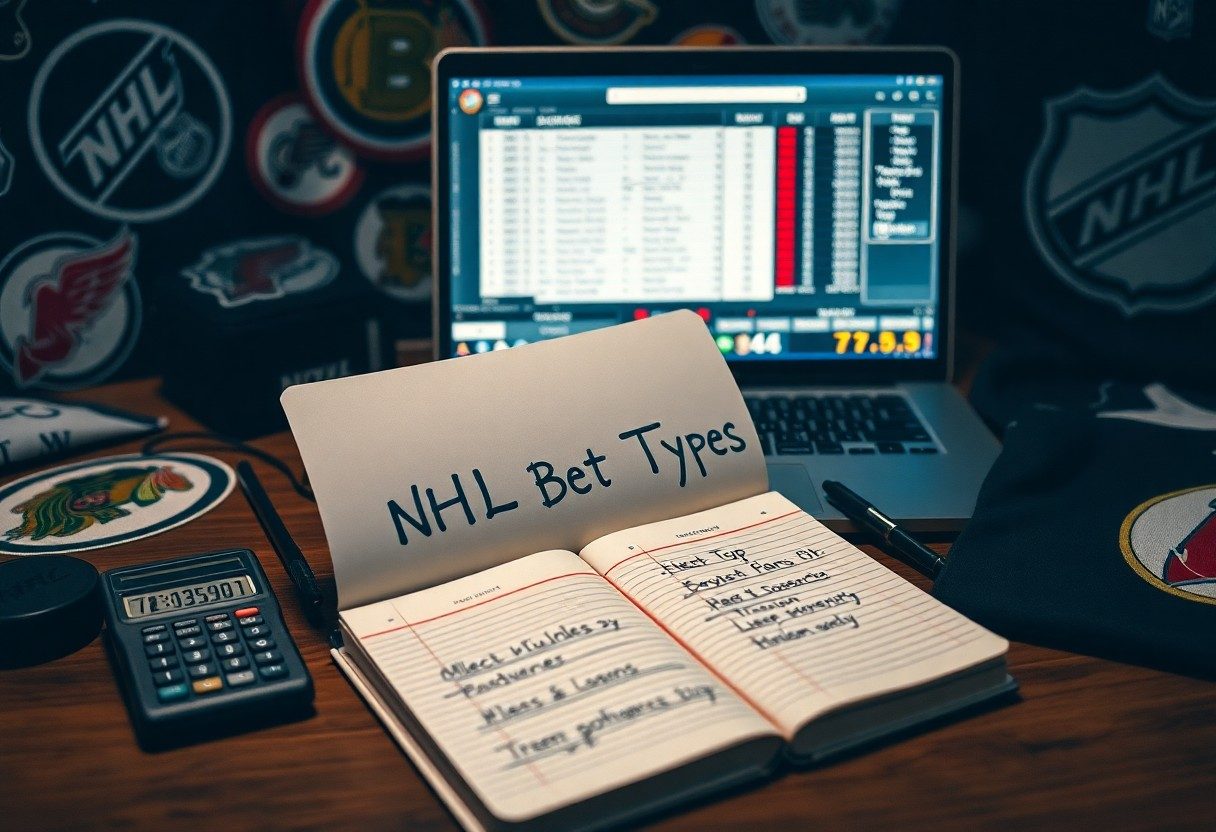Most NHL fans and bettors seek to enhance their experience by understanding various betting types available throughout the season. This comprehensive guide breaks down all the bet types you can place, ranging from moneyline and puck line to over/under and prop bets. Each section provides insights on how to effectively use these options, ensuring you maximize your betting potential while enjoying the thrill of the game. Equip yourself with the knowledge to navigate the NHL betting landscape confidently.
Understanding NHL Bet Types
NHL betting offers various types of wagers to cater to different strategies and preferences. Each type has unique characteristics that can maximize engagement and profitability for bettors.
- Moneyline Bets
- Puck Line Bets
- Over/Under Bets
- Prop Bets
- Futures Bets
After exploring these options, bettors can leverage their understanding throughout the season.
| Bet Type | Description |
| Moneyline Bets | Wager on a team to win the game. |
| Puck Line Bets | Wager with a point spread, favoring the stronger team. |
| Over/Under Bets | Wager on the total number of goals scored. |
| Prop Bets | Bets on specific events or player performance. |
| Futures Bets | Wager on long-term outcomes, like championship winners. |
Moneyline Bets
Moneyline bets are the simplest form of betting, where you pick the team you believe will win the game outright. Odds are set to reflect the perceived strength of each team. A favorite may have lower odds, while an underdog offers higher returns. This type of bet removes point spreads, focusing only on the end result.
Puck Line Bets
Puck line bets involve betting against the spread in hockey. Typically set at +1.5 or -1.5 goals, this bet requires the favored team to win by at least two goals, while the underdog can lose by one goal or win outright to cover the spread. This type increases potential payout when betting on a favored team.
Puck Line bets not only enhance the stakes of a matchup but also provide additional strategic layers for bettors. Understanding a team’s scoring strength versus their opponent’s defensive capabilities is necessary. Utilizing stats, like previous matchups and current form, can significantly influence decision-making for such bets.
Over/Under Bets
Over/Under bets focus on the total goals scored in a game rather than the outcome. Sportsbooks set a line, and bettors wager on whether the actual total will be above or below that number. This bet type allows for great engagement, where you can root for goals regardless of your team allegiance.
In NHL Over/Under betting, analyzing team offensive and defensive statistics can significantly inform your decision. Factors such as recent performance, injuries, and game location play critical roles in affecting scoring potential, making it a dynamic bet type for studying trends throughout the season.
Prop Bets
Prop bets are unique wagers on specific in-game occurrences, such as player statistics or team milestones. They don’t necessarily pertain to the game’s final outcome, providing a broader range of betting options. For example, you may bet on whether a certain player will score or how many assists they will have.
Prop bets can be particularly engaging during big games, like the Stanley Cup or specific rivalries. They encourage deeper research and a focus on individual performances, making the betting experience even more immersive. Some sportsbooks also offer novelty props, enhancing excitement through unpredictable outcomes.
Futures Bets
Future bets allow you to wager on long-term outcomes, such as which team will win the Stanley Cup or a player winning the MVP. These bets often offer higher odds, reflecting the uncertainty of the season’s duration. Futures betting is a great way to sustain interest throughout the season.
Wagering on futures requires a strong understanding of team dynamics, player potential, and anticipated changes, like trades or injuries. Futures can offer substantial returns, particularly when placed early in the season when odds may not yet reflect a team’s full potential. Monitoring the season’s progression is necessary for successful future bets.
Step-by-Step Guide to Placing Your Bets
| Step | Description |
| 1. Set Up an Account | Select a reliable sportsbook and complete the registration process. |
| 2. Fund Your Account | Deposit funds using your preferred payment method. |
| 3. Select Your Bet Type | Choose from various NHL bet types based on your strategy. |
| 4. Place Your Bet | Enter your wager amount and confirm the bet. |
| 5. Track Your Bets | Monitor outcomes and adjust your strategy accordingly. |
Setting Up an Account
To begin betting, select a reputable sportsbook and complete the registration process, providing necessary personal details. Ensure you verify your identity to comply with regulations. Different sportsbooks offer varying features, so consider those best matching your betting style and preferences.
Bankroll Management Tips
Effective bankroll management is critical for long-term success in betting. Set a budget that you can afford to lose, and utilize a staking plan to determine bet sizes based on your total bankroll. Consistently track your bets to assess performance and adjust strategy with changing circumstances.
- Set a budget to avoid overspending.
- Utilize a staking plan to manage bet sizes.
- Track your bets for performance assessment.
For optimal results, allocate a specific percentage of your bankroll to individual bets, avoiding large wagers that could significantly impact your total funds. Maintain discipline by sticking to your plan and resisting impulsive bets based on emotions. Thou shall prioritize sustainability over short-term gains.
Researching Teams and Players
Thorough research on teams and players is necessary for informed betting. Delve into statistics, recent performances, head-to-head matchups, and player injuries. Keeping track of these factors helps to identify trends and provides an edge over less informed bettors.
Analyzing team dynamics such as coaching strategies, line combinations, and player form contributes significantly to betting success. Watching games, reading expert analyses, and accessing reliable statistics can uncover insights that raw data may not cover. Effective research enables bettors to make decision-based wagers rather than relying solely on gut feelings. Thou shall stay informed for a competitive edge.
Key Factors to Consider When Betting
- Player performance
- Team statistics
- Injuries and line changes
- Home/Away games
The importance of these factors can significantly impact your betting success.
Player Performance
Analyzing player performance is vital for informed betting. Factors like current form, historical performance, and matchup statistics can determine a player’s contribution to the team’s success. Look for trends such as scoring streaks or strong defensive plays, which can influence outcomes.
Team Statistics
Examining team statistics offers insights into overall performance. Metrics such as goals scored, goals against, and special teams effectiveness highlight team strengths and weaknesses. Evaluating head-to-head results further contextualizes the dynamics between competing teams.
Focusing on specific metrics helps in understanding a team’s consistency. For instance, a team ranked in the top five for goals scored but lower in goals against may indicate a propensity for high-scoring games. Conversely, a strong defensive team with a subpar offense could suggest lower-scoring matchups. Tracking these statistics allows for more strategic betting.
Injuries and Line Changes
Injuries and line changes can drastically affect team performance. Keep abreast of injury reports, as absent key players can alter a team’s strategy and effectiveness. Line changes can also shift team dynamics, presenting opportunities or risks for bettors.
An injury to a star player may decrease a team’s overall scoring ability, while a replacement’s performance can be unpredictable. Constantly monitoring these developments helps adapt bet placements in response to changing team conditions and potential gaps in performance.
Home/Away Games
Home/Away games tend to significantly impact team performance. Home teams usually benefit from familiar surroundings and fan support, leading to stronger performances. Conversely, teams playing away may struggle with travel fatigue and a lack of crowd motivation.
Statistics often show that certain teams perform better at home, possibly due to their schedule or environmental factors. For instance, teams with a strong home record against weaker away teams can be favorable betting candidates. Analyzing both teams’ home and away performance can yield valuable insights for bettors throughout the season.
Tips for Successful Betting
Successful NHL betting requires a combination of knowledge, strategy, and discipline. Start by focusing on these core elements:
- Research players and teams
- Manage your bankroll
- Stick to your strategy
- Analyze game trends
- Stay disciplined during winning and losing streaks
Perceiving the game through data can significantly impact your betting outcomes.
Staying Informed
Keeping up-to-date with player injuries, team dynamics, and statistical trends is imperative for effective betting. Follow credible sources and sports analysts to gain insights that can shape your wagers, making you a more informed bettor.
Shopping for the Best Odds
Finding the best odds across multiple sportsbooks can maximize your potential winnings. Odds may vary widely, and even a small difference can significantly affect your payout.
For instance, if you bet $100 on a team at +150 odds, you’d win $150 from one book but only $130 from another at +130 odds. This discrepancy highlights the importance of comparing lines. Use odds comparison websites or apps to streamline your search, and consider signing up for multiple sportsbooks to take advantage of different offers and promotions, ensuring the best value with each bet.
Utilizing Betting Strategies
Implementing betting strategies can help you approach NHL wagering more systematically. Whether using the Martingale system or finding value bets, the right method can enhance your overall betting performance.
Strategies like the Kelly Criterion can help determine your bet size based on your edge in a particular game, while hedging allows you to minimize potential losses in uncertain scenarios. Additionally, pursuing specific trends, such as home-ice advantage or matchup history, can guide your bets effectively. Consistently applying a strategy tailored to your preferences will yield more informed decisions, enhancing your chances of success over time.
Pros and Cons of Different Bet Types
| Pros | Cons |
|---|---|
| Offers various strategies for different risk levels | Complexity can lead to confusion |
| Payouts can be high with prop bets | Prop bets often rely on unpredictable outcomes |
| Moneyline bets are simple and easy to understand | Lower-risk bets may offer smaller payouts |
| Point spreads can level the playing field | Involves understanding of team performance |
| Live betting allows real-time engagement | Fast-paced action can lead to hasty decisions |
Advantages and Disadvantages of Each Bet Type
Each NHL bet type comes with its own set of advantages and disadvantages. For instance, while moneyline bets are straightforward, point spreads require deeper analysis of team performances. Prop bets can yield high payouts, yet they often involve unpredictable elements. Understanding the balance of risk and reward inherent in each type is necessary for a successful betting strategy.
When to Use Each Bet Type
Choosing the right bet type relies heavily on the context of the game, your personal risk tolerance, and available information. Moneyline bets are ideal for clear favorites, while point spreads become useful when teams are closely matched. Prop bets shine when you have insights into specific player performances. Ultimately, timing and research dictate when to deploy each betting strategy effectively.
For example, in a matchup where one team is heavily favored, a moneyline might be the safest choice for a simple wager. Conversely, if you’re analyzing a high-scoring game, the point spread could provide better value. Staying informed about team injuries and recent performance trends also helps in making informed decisions on when to opt for specific bet types, ensuring your strategy adapts throughout the NHL season.
Common Mistakes to Avoid
Being aware of common betting pitfalls can significantly enhance your success in NHL wagering. Many bettors, both new and experienced, fall into traps that can derail their strategy and lead to unnecessary losses. Avoiding these mistakes can help maintain a disciplined approach throughout the season.
Chasing Losses
Chasing losses occurs when bettors impulsively increase their stakes after a losing bet in an attempt to recover their money. This often leads to a cycle of poor decisions, where emotions overshadow rational thinking. The desire to break even can escalate losses further rather than correct them.
Over-Betting
Over-betting refers to placing wagers that exceed a bettor’s means, risking more than one can afford to lose. It can stem from overconfidence or the belief that a particular outcome is guaranteed. This behavior can spiral into significant financial strain and emotional stress.
To avoid over-betting, establish a clear budget for your betting activities. Stick to a percentage of your total bankroll for each bet, commonly recommended at 1-5% depending on your confidence level. For instance, if your bankroll is $1,000, a 2% stake means betting $20 per game. This approach enables you to weather losing streaks without devastating losses.
Neglecting Research
Neglecting research involves placing bets based on gut feelings or without sufficient data analysis. This practice can lead to uninformed decisions and increased losses, as it bypasses valuable insights such as team statistics, player performance, and recent trends.
Thorough research is fundamental to successful betting. Analyze factors such as team injuries, historical performance against opponents, and current form. For example, if a key player is sidelined due to injury, a team’s chances of winning may be significantly diminished. Utilize comprehensive stats and reliable sources to make informed bets, ensuring each wager is backed by solid data and analysis rather than intuition alone.
To wrap up
Now that you have a complete understanding of the various NHL bet types, you can strategically employ them throughout the season to enhance your betting experience. Each bet type serves a unique purpose, whether you’re focusing on spread betting, moneyline wagers, or totals. By familiarizing yourself with these options, you will be better positioned to make informed decisions, maximizing your chances of success in NHL betting. Utilize this guide as a reference to navigate your betting journey effectively.
FAQ
Q: What are the most common NHL bet types available?
A: The most common NHL bet types include Moneyline bets, Puck Line bets, Total Goals (Over/Under), and Futures bets. Moneyline bets involve picking the outright winner of a game. Puck Line bets create a 1.5-goal spread, requiring the favored team to win by two or more goals. Total Goals bets involve wagering on the combined score of both teams, while Futures bets allow you to bet on outcomes such as which team will win the Stanley Cup throughout the season.
Q: How do Puck Line bets work in NHL betting?
A: Puck Line bets are unique to hockey and involve a spread of 1.5 goals. If you bet on the favorite, they must win by at least two goals for the bet to be successful. Conversely, if you bet on the underdog, they can either win the game outright or lose by one goal for the bet to pay off. This bet type adds an extra layer of strategy, as it can lead to higher payouts, especially for underdogs.
Q: What strategies can enhance my NHL betting experience?
A: Effective NHL betting strategies include tracking team form, understanding player injuries, analyzing historical matchups, and monitoring special teams performance. Keeping an eye on money management, such as setting a budget for each bet and avoiding chasing losses, is also vital. Utilizing statistical analysis and advanced metrics can provide better insights into making informed bets throughout the season.













